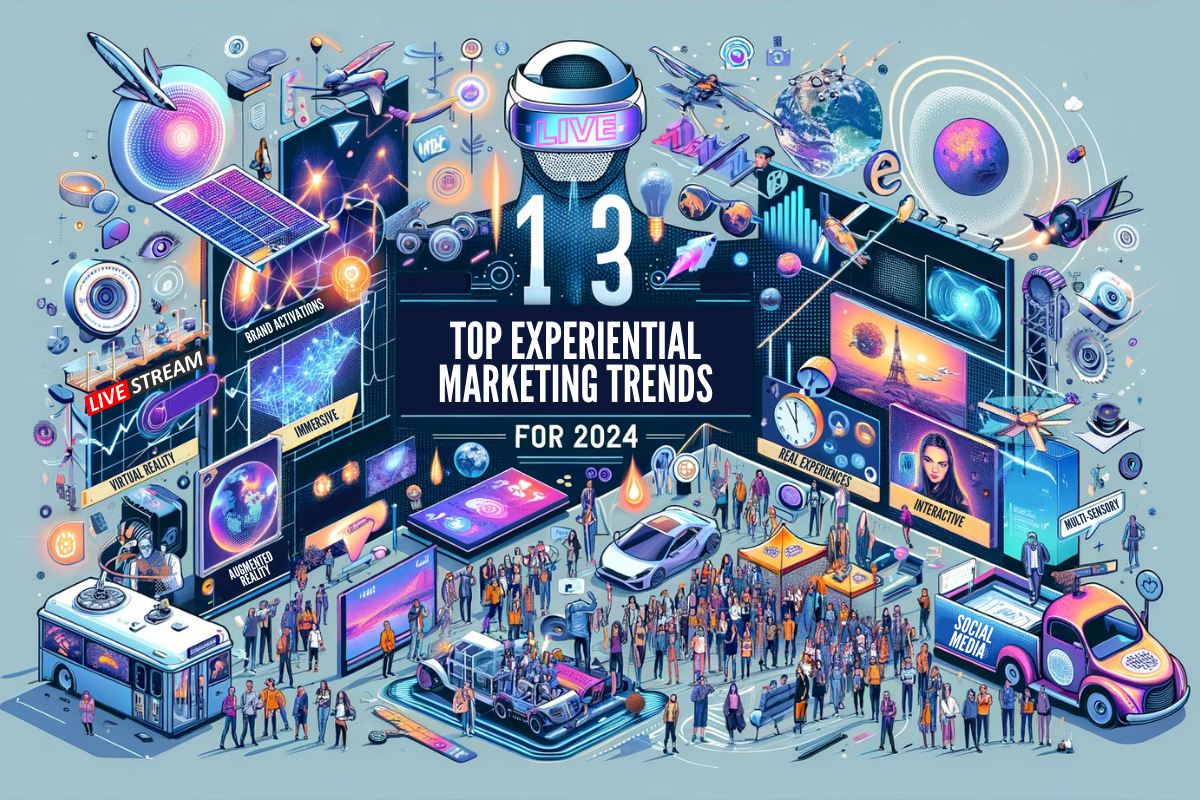
In the dynamic world of marketing, staying ahead is crucial. As 2024 begins, experiential marketing takes the cake, yet again, evolving to meet changing consumer...
Sustainability is a personal pledge to Mother Earth, a commitment to nurture rather than deplete. It's a mindful conversation with nature, a promise to be responsible stewards.
Think of it as a collection of small, heartfelt gestures – recycling, reducing waste, and choosing eco-friendly products. It's a dance with our planet, a chance for each of us to contribute to a healthier, happier future.
Welcome to the warm embrace of sustainability, where every action becomes a loving brushstroke on the canvas of a greener world.
Sustainable Marketing VS Green Marketing
Benefits of Sustainable Marketing
Walk It as You Talk It: 11 Sustainable Strategies & Practices
Navigating sustainability in marketing involves distinguishing between Sustainable Marketing and Green Marketing.
Think of them as siblings on the eco-conscious journey, each with its unique personality. Sustainable Marketing is the wise elder, emphasizing holistic practices that benefit society and the environment.
It's about fostering positive change and weaving social as well as ethical considerations into your campaigns.
On the flip side, Green Marketing is the vibrant sibling, focusing specifically on environmentally friendly aspects. It's like the colorful leaves on the family tree, showcasing products with reduced environmental impact.
While both share a commitment to promoting eco-conscious choices, Sustainable Marketing casts a broader net, including social and ethical considerations, while Green Marketing dives deep into the lush greens of environmental impact.
Together, they form a harmonious duo, making for responsible consumerism.

Sustainable marketing helps build a positive brand image by showcasing a commitment to environmental and social responsibility.
Consumers are more likely to trust and engage with brands that prioritize sustainability, leading to an enhanced reputation and increased customer loyalty.
Embracing sustainable practices can provide a competitive edge in the market. As consumers become more environmentally and socially conscious, businesses that demonstrate a commitment to sustainability stand out from their competitors.
This differentiation can attract new customers and retain existing ones who prioritize responsible consumption.
Sustainable marketing contributes to the long-term viability of a business by fostering efficiency, reducing environmental impact, and ensuring compliance with evolving regulations.
By incorporating sustainable practices into the core of your business operations, you are better positioned to adapt to changing market expectations and secure your place in a socially and environmentally conscious future.

Sustainable packaging, such as using biodegradable materials or incorporating recycled plastics, isn't just about reducing environmental impact; it's a game-changer in the world of marketing.
It's a bold statement that resonates with eco-conscious consumers, showing your brand's commitment to responsible practices.
By wrapping products in compostable packaging, recycled cardboard, or plant-based materials, you not only shrink your carbon footprint but also stand out in a market where consumers value socially and environmentally responsible choices.
It's more than just a package; it's a pledge to a greener, brighter future.
Elevating sustainable marketing involves connecting with your company's life force—your employees.
Offering them a chance to contribute to projects in meaningful ways can help them feel heard and supported. This involvement not only raises awareness about sustainability initiatives internally but also contributes to a company culture that values environmentally and socially responsible practices.
Initiatives like forming green committees, implementing a weekly vegetarian day, or conducting educational workshops on energy reduction and recycling play a vital role in engaging your staff and fostering a positive work environment.
By actively incorporating employee perspectives into sustainable practices, you enhance your marketing effectiveness and cultivate a culture that advocates for responsible business conduct.

Catering to your target audience is the cornerstone of sustainable marketing.
It’s more than just fulfilling immediate needs; it's about understanding and addressing the values and concerns of environmentally conscious consumers.
By putting the eco-aware customer at the forefront of your marketing strategies, you align your brand with their values to create more personal connections. It's not just about selling products; it's a commitment to delivering sustainable solutions that resonate with those who prioritize ethical and responsible choices.
In sustainable marketing, being consumer-oriented means creating a greener, more meaningful journey for customers who seek environmentally friendly options that create a positive impact on the world.
Supporting sustainable causes is not just about promoting products; it's about championing and contributing to modern-day environmental and social initiatives that matter.
For example, partnering with organizations focused on climate action, ocean conservation, or social equality can be impactful strategies. By incorporating support for sustainable causes into your marketing strategies, you showcase a commitment to making a positive impact.
It's a powerful way to engage eco-conscious consumers, fostering brand loyalty and trust.
When your brand stands behind sustainable causes, every purchase becomes a vote for a better world. It's more than marketing; it's a shared journey toward creating meaningful change and building a future where businesses are forces for good.
These two form the bedrock of responsible marketing.
It's not just about showcasing products; it's about being open, honest, and accountable in every aspect of your business. For instance, providing detailed information about supply chain practices, product origins, and eco-friendly certifications are a few ways your brand can showcase transparency.
But by prioritizing both in your marketing strategies, you build trust with consumers. When your brand embraces transparency, consumers feel empowered and informed, fostering a sense of authenticity.
In the world of sustainable marketing, transparency and accountability are more than values—they are the guiding principles that create a lasting connection between your business and ethically conscious consumers, building a foundation for a trustworthy and responsible future.

Recycling and waste reduction are the driving forces of eco-friendly marketing.
By doing so, you are committing to minimizing environmental impact.
By demonstrating the use of recycled materials or introducing take-back programs, you can display a dedication to responsible consumption. It's a powerful way to resonate with environmentally conscious consumers, demonstrating a vow to sustainable practices.
When your brand embraces recycling and waste reduction, every purchase becomes a step towards a cleaner, greener planet.
It's more than marketing; it's a shared journey towards a circular economy where businesses actively contribute to reducing waste and preserving the environment for future generations.
Mindful consumption is about encouraging thoughtful choices that align with individual values and global well-being. By emphasizing mindful consumption in your marketing strategies, you promote a culture of responsible and intentional purchasing.
For example, you could implement augmented reality apps to allow your customers to visualize the sustainability journey of a product or you could utilize blockchain technology for transparent supply chains.
By doing so, you’re able to connect with consumers who seek meaningful, ethical, and sustainable options. When your brand advocates for mindful consumption, it goes beyond transactions—it guides customers toward a more conscious living.
In the realm of sustainable marketing, mindful consumption is more than a trend; it's a commitment to making choices that positively impact both individuals and the planet.
Pursuing something beyond the bottom line is the soul of purpose-driven marketing.
It's not just about profits; it's about embracing a broader mission that transcends financial success. By incorporating a higher purpose into your marketing strategies, such as supporting renewable energy projects or backing social justice initiatives, you communicate a commitment to making a positive impact on society and the environment.
It acts as a potent method to resonate with socially conscious consumers, fostering brand loyalty and trust. When your brand pursues something beyond the bottom line, every sale becomes a contribution to a greater cause.
It's more than marketing; it's a shared journey towards creating meaningful change and building a future where businesses are not just successful but also forces for good.
Taking a paperless approach and transitioning to digital formats is a pivotal step in advancing sustainable marketing practices. By minimizing reliance on traditional paper materials, you contribute to a reduction in deforestation, energy consumption, and overall environmental impact.
Digital platforms offer a dynamic and eco-friendly avenue for your marketing campaigns, allowing for the creation of engaging content that can be easily shared and accessed without the need for physical materials.
Furthermore, the adoption of digital formats enables you to streamline processes, reduce waste, and reach a broader audience through online channels.
This shift not only aligns with environmental conservation efforts but also positions your brand as an environmentally conscious entity, fostering positive brand perception and attracting environmentally conscious consumers.

Vetting vendors and selecting sustainability-aligned business partners is the foundation of responsible sourcing in eco-conscious marketing.
By rigorously evaluating and choosing partners who share similar environmental and ethical values, you reinforce your dedication to responsible practices.
It proves to be effective in resonating with socially and environmentally conscious buyers, demonstrating a commitment to a sustainable ecosystem. When your brand carefully selects partners based on sustainability principles, every collaboration becomes a joint effort toward a greener, more ethical industry.
It's more than business; it's about building a supply chain that mirrors the values of a socially and environmentally responsible world.
The use of EVs, bikes, scooters, or even walking is the driving force behind sustainable transportation in experiential marketing. By incorporating environmentally friendly transportation in your marketing strategies, you showcase a dedication to sustainable practices.
It offers a dynamic way to connect with consumers who value eco-conscious choices, demonstrating a commitment to reducing air pollution and promoting cleaner commuting alternatives.
When your brand embraces the use of EVs or other sustainable modes of transportation, every trip becomes a step towards a more carbon-neutral future.
Patagonia uses organic, recyclable, and "Fair Trade" certified materials in its apparel and donates some of its profits to environmental initiatives.
In addition, they are among the founding members of the Sustainable Apparel Coalition, a collection of businesses committed to lessening their environmental impact.
They even employ solar power at its Ventura, California, headquarters!
For a considerable amount of time, Lush has been seen as a brand that practices environmental responsibility better than most.
They claim to be working on the remaining 10% and employ 90% recycled packaging materials in their manufacturing operations, alongside several other initiatives.
To encourage more consumers to return empty products to stores, they redesigned their prior recycling program in the UK and Ireland throughout 2021.
For each qualifying item people brought back, they offered a 50% discount that could be used toward in-store purchases that day.
Honda targets a zero environmental impact society by 2050 through its Triple Action to ZERO program, emphasizing carbon neutrality, clean energy, and resource circulation.
Aiming for 100% use of sustainable resources, their company promotes life cycle assessment for CO2 reduction, setting ambitious targets for carbon neutrality and electrified product sales by 2050.
Additionally, Honda actively engages in resource circulation with recycled materials and biodiversity conservation initiatives like the Taskforce on Climate-related Financial Disclosures (TCFD).
They also manage climate-related risks, conduct TCFD-recommended scenario analyses, and disclose relevant information.

These eleven strategies will guide us toward a future where ethical, environmental, and social responsibility are integral to success. Sustainability, a personal pledge to Mother Earth, involves small gestures for a healthier, happier future.
The distinction between Sustainable Marketing and Green Marketing offers a nuanced approach to responsible consumerism, with the former encompassing social and ethical considerations.
The benefits of sustainable marketing extend beyond profits, enhancing brand reputation, providing a competitive advantage, and ensuring your long-term success.
From utilizing sustainable packaging to connecting with your employees, supporting causes, being transparent, and embracing mindful consumption, each strategy is an investment in a greener, more sustainable world.
Examples of sustainable businesses, such as Patagonia, Lush, and Honda, illustrate how real-world companies integrate sustainability into their DNA.
These companies prioritize eco-friendly practices and contribute to broader initiatives, such as reducing environmental impact and promoting carbon neutrality.
As we embark on the journey toward sustainable marketing, every choice plants a seed for a cleaner time to come. Adopting these practices secures your business in a socially and environmentally conscious future, transforming not only your brand but entire industries.
The road to sustainable marketing promises a future where businesses are forces for good.
In today's conscious marketplace, sustainability isn't just a buzzword—it's a key to success. Marketing with a focus on sustainability meets consumer expectations, boosts brand reputation, ensures compliance, saves costs, sets you apart in the market, attracts top talent, and secures long-term business viability. It's not just a strategy; it's a commitment to a better future.
Sustainability plays a pivotal role in marketing planning, acting as the compass guiding businesses towards success. Integrating sustainability ensures alignment with consumer values, builds a positive brand image, navigates regulatory landscapes, drives cost-effective practices, sets brands apart in competitive markets, attracts top talent, and secures long-term business resilience.
Sustainable marketing is based on five main ideas and tactics. They go by the names of customer-value marketing, innovative marketing, marketing with a sense of mission, consumer-oriented marketing, and societal marketing.

In the dynamic world of marketing, staying ahead is crucial. As 2024 begins, experiential marketing takes the cake, yet again, evolving to meet changing consumer...

Sensory marketing has altered how we communicate with our customers. You can use the power of sensory stimulation to create memorable, immersive experiences.
The science...